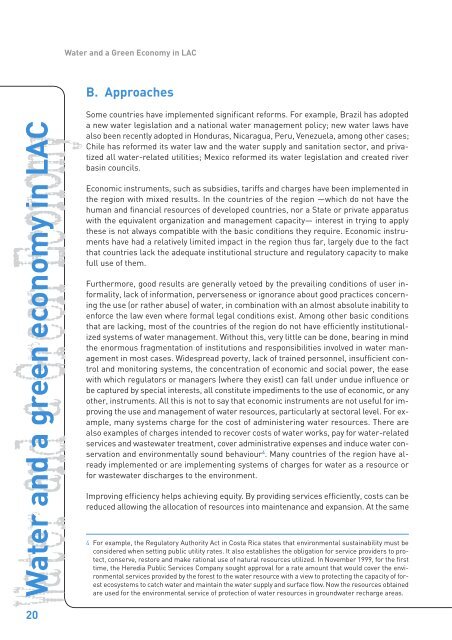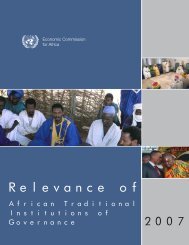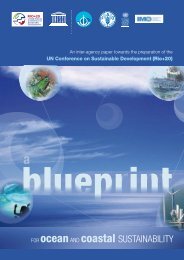Water and a Green Economy in Latin America and the Caribbean
Water and a Green Economy in Latin America and the Caribbean
Water and a Green Economy in Latin America and the Caribbean
Create successful ePaper yourself
Turn your PDF publications into a flip-book with our unique Google optimized e-Paper software.
<strong>Water</strong> <strong>and</strong> a <strong>Green</strong> <strong>Economy</strong> <strong>in</strong> LAC<br />
B. Approaches<br />
<strong>Water</strong><strong>and</strong>a<strong>Green</strong><strong>Economy</strong><br />
<strong>and</strong> a green economy <strong>in</strong> LAC<br />
20<br />
Some countries have implemented significant reforms. For example, Brazil has adopted<br />
a new water legislation <strong>and</strong> a national water management policy; new water laws have<br />
also been recently adopted <strong>in</strong> Honduras, Nicaragua, Peru, Venezuela, among o<strong>the</strong>r cases;<br />
Chile has reformed its water law <strong>and</strong> <strong>the</strong> water supply <strong>and</strong> sanitation sector, <strong>and</strong> privatized<br />
all water-related utilities; Mexico reformed its water legislation <strong>and</strong> created river<br />
bas<strong>in</strong> councils.<br />
Economic <strong>in</strong>struments, such as subsidies, tariffs <strong>and</strong> charges have been implemented <strong>in</strong><br />
<strong>the</strong> region with mixed results. In <strong>the</strong> countries of <strong>the</strong> region —which do not have <strong>the</strong><br />
human <strong>and</strong> f<strong>in</strong>ancial resources of developed countries, nor a State or private apparatus<br />
with <strong>the</strong> equivalent organization <strong>and</strong> management capacity— <strong>in</strong>terest <strong>in</strong> try<strong>in</strong>g to apply<br />
<strong>the</strong>se is not always compatible with <strong>the</strong> basic conditions <strong>the</strong>y require. Economic <strong>in</strong>struments<br />
have had a relatively limited impact <strong>in</strong> <strong>the</strong> region thus far, largely due to <strong>the</strong> fact<br />
that countries lack <strong>the</strong> adequate <strong>in</strong>stitutional structure <strong>and</strong> regulatory capacity to make<br />
full use of <strong>the</strong>m.<br />
Fur<strong>the</strong>rmore, good results are generally vetoed by <strong>the</strong> prevail<strong>in</strong>g conditions of user <strong>in</strong>formality,<br />
lack of <strong>in</strong>formation, perverseness or ignorance about good practices concern<strong>in</strong>g<br />
<strong>the</strong> use (or ra<strong>the</strong>r abuse) of water, <strong>in</strong> comb<strong>in</strong>ation with an almost absolute <strong>in</strong>ability to<br />
enforce <strong>the</strong> law even where formal legal conditions exist. Among o<strong>the</strong>r basic conditions<br />
that are lack<strong>in</strong>g, most of <strong>the</strong> countries of <strong>the</strong> region do not have efficiently <strong>in</strong>stitutionalized<br />
systems of water management. Without this, very little can be done, bear<strong>in</strong>g <strong>in</strong> m<strong>in</strong>d<br />
<strong>the</strong> enormous fragmentation of <strong>in</strong>stitutions <strong>and</strong> responsibilities <strong>in</strong>volved <strong>in</strong> water management<br />
<strong>in</strong> most cases. Widespread poverty, lack of tra<strong>in</strong>ed personnel, <strong>in</strong>sufficient control<br />
<strong>and</strong> monitor<strong>in</strong>g systems, <strong>the</strong> concentration of economic <strong>and</strong> social power, <strong>the</strong> ease<br />
with which regulators or managers (where <strong>the</strong>y exist) can fall under undue <strong>in</strong>fluence or<br />
be captured by special <strong>in</strong>terests, all constitute impediments to <strong>the</strong> use of economic, or any<br />
o<strong>the</strong>r, <strong>in</strong>struments. All this is not to say that economic <strong>in</strong>struments are not useful for improv<strong>in</strong>g<br />
<strong>the</strong> use <strong>and</strong> management of water resources, particularly at sectoral level. For example,<br />
many systems charge for <strong>the</strong> cost of adm<strong>in</strong>ister<strong>in</strong>g water resources. There are<br />
also examples of charges <strong>in</strong>tended to recover costs of water works, pay for water-related<br />
services <strong>and</strong> wastewater treatment, cover adm<strong>in</strong>istrative expenses <strong>and</strong> <strong>in</strong>duce water conservation<br />
<strong>and</strong> environmentally sound behaviour 4 . Many countries of <strong>the</strong> region have already<br />
implemented or are implement<strong>in</strong>g systems of charges for water as a resource or<br />
for wastewater discharges to <strong>the</strong> environment.<br />
Improv<strong>in</strong>g efficiency helps achiev<strong>in</strong>g equity. By provid<strong>in</strong>g services efficiently, costs can be<br />
reduced allow<strong>in</strong>g <strong>the</strong> allocation of resources <strong>in</strong>to ma<strong>in</strong>tenance <strong>and</strong> expansion. At <strong>the</strong> same<br />
4 For example, <strong>the</strong> Regulatory Authority Act <strong>in</strong> Costa Rica states that environmental susta<strong>in</strong>ability must be<br />
considered when sett<strong>in</strong>g public utility rates. It also establishes <strong>the</strong> obligation for service providers to protect,<br />
conserve, restore <strong>and</strong> make rational use of natural resources utilized. In November 1999, for <strong>the</strong> first<br />
time, <strong>the</strong> Heredia Public Services Company sought approval for a rate amount that would cover <strong>the</strong> environmental<br />
services provided by <strong>the</strong> forest to <strong>the</strong> water resource with a view to protect<strong>in</strong>g <strong>the</strong> capacity of forest<br />
ecosystems to catch water <strong>and</strong> ma<strong>in</strong>ta<strong>in</strong> <strong>the</strong> water supply <strong>and</strong> surface flow. Now <strong>the</strong> resources obta<strong>in</strong>ed<br />
are used for <strong>the</strong> environmental service of protection of water resources <strong>in</strong> groundwater recharge areas.

















